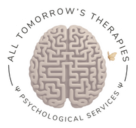
Dr Rebecca Ryan
Clinical Psychologist
Throughout my career as a Clinical Psychologist, I’ve worked with a wide range of people and professionals, both privately and in the NHS, including children and young people, adults, older adults, families, schools, and businesses. I take a holistic approach, drawing from various psychological models, including psychodynamic theories, ACT, DBT, and attachment-based approaches like DDP.
With an MSc in Human Evolution and Behaviour, I’m particularly drawn to evolutionary perspectives in psychology, such as Polyvagal Theory and Compassion-Focused Therapy.
What I love most about Clinical Psychology is the ability to integrate different approaches when thinking about an individual, a group, or a challenge. I believe this flexibility allows for a truly tailored and well-rounded way of working, ensuring that support is not just evidence-based but also meaningful and personal.
I am a big believer in the value of community. Find out why using All Tomorrow’s Therapies means YOU will change someone’s life here.
Associates of All Tomorrow’s Therapies

Dr Emily Mason
Clinical and Forensic Psychologist
Emily is a dual-qualified Clinical and Forensic Psychologist, registered with the HCPC. She has worked across a broad range of settings including the NHS, private healthcare, charities, the Criminal Justice System, and specialist neurodiversity services. Her experience spans all age groups, from children and adolescents to adults and older adults, often supporting those with complex or multiple needs.
She works with a wide range of psychological, emotional and relational difficulties — including anxiety, depression, low self-esteem, trauma, interpersonal challenges, and behaviours of concern such as risk and/or offending behaviour. Her approach is collaborative and integrative, drawing on evidence-based models like CBT, DBT, Compassion-Focused Therapy and systemic approaches to tailor support to each individual’s needs.
An initial assessment helps build a clear picture of what’s going on and how it links to someone’s life experiences. From there, Emily works with clients to make sense of their difficulties and offer support that feels personal, meaningful, and relevant.
Alongside therapy, she also offers specialist assessments, clinical supervision, training, and consultation. She continues to stay connected to teaching and research, supervising trainee psychologists and lecturing at local universities — something she finds hugely rewarding.
Outside of work, Emily’s most likely pottering in the garden, exploring craft fairs, or dunking too many biscuits in her tea.


